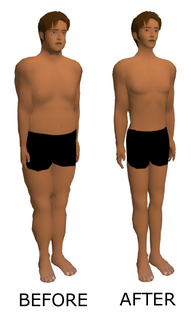Dieting is the practice of eating food in a regulated way to decrease, maintain, or increase body weight, or to prevent and treat diseases such as diabetes and obesity. Dieting to lose weight is recommended for people with weight-related health problems, but not otherwise healthy people. As weight loss depends on calorie intake, different kinds of calorie-reduced diets, such as those emphasising particular macronutrients, have been shown to be no more effective than one another. As weight regain is common, diet success is best predicted by long-term adherence. Regardless, the outcome of a diet can vary widely depending on the individual.
An eating disorder is a mental disorder defined by abnormal eating habits that negatively affect a person's physical or mental health. Types of eating disorders include binge eating disorder, where people eat a large amount in a short period of time; anorexia nervosa, where people have an intense fear of gaining weight and restrict food or overexercise to manage this fear; bulimia nervosa, where people eat a lot and then try to rid themselves of the food; pica, where people eat non-food items; rumination syndrome, where people regurgitate food; avoidant/restrictive food intake disorder (ARFID), where people have a reduced or selective food intake due to some psychological reasons ; and a group of other specified feeding or eating disorders. Anxiety disorders, depression and substance abuse are common among people with eating disorders. These disorders do not include obesity.

The Myers–Briggs Type Indicator (MBTI) is an introspective self-report questionnaire indicating differing psychological preferences in how people perceive the world and make decisions. The test attempts to assign four categories: introversion or extraversion, sensing or intuition, thinking or feeling, judging or perceiving. One letter from each category is taken to produce a four-letter test result, such as "INFJ" or "ENFP".

The hypothalamic–pituitary–adrenal axis is a complex set of direct influences and feedback interactions among three components: the hypothalamus, the pituitary gland, and the adrenal glands.

Addison's disease, also known as primary adrenal insufficiency and hypocortisolism, is a rare long-term endocrine disorder characterized by inadequate production of the steroid hormones cortisol and aldosterone by the two outer layers of the cells of the adrenal glands, causing adrenal insufficiency. Symptoms generally come on slowly and insidiously and may include abdominal pain and gastrointestinal abnormalities, weakness, and weight loss. Darkening of the skin in certain areas may also occur. Under certain circumstances, an adrenal crisis may occur with low blood pressure, vomiting, lower back pain, and loss of consciousness. Mood changes may also occur. Rapid onset of symptoms indicates acute adrenal failure which is a serious and emergent condition. An adrenal crisis can be triggered by stress, such as from an injury, surgery, or infection.

Weight loss, in the context of medicine, health, or physical fitness, refers to a reduction of the total body mass, by a mean loss of fluid, body fat, or lean mass. Weight loss can either occur unintentionally because of malnourishment or an underlying disease, or from a conscious effort to improve an actual or perceived overweight or obese state. "Unexplained" weight loss that is not caused by reduction in calorific intake or exercise is called cachexia and may be a symptom of a serious medical condition. Intentional weight loss is commonly referred to as slimming.

A fad diet is a diet that becomes popular for a short time, similar to fads in fashion, without being a standard dietary recommendation, and often making unreasonable claims for fast weight loss or health improvements. There is no single definition of what is a fad diet. The term fad diet encompasses a variety of diets with different approaches and evidence bases, and thus different outcomes, advantages, and disadvantages.
Body odor is present in all animals, including humans, and its intensity can be influenced by many factors. Body odor has a strong genetic basis, but can also be strongly influenced by various diseases and physiological conditions. Though body odor has played an important role in early humankind, it is generally considered to be an unpleasant odor amongst many human cultures.
Nutritional genomics, also known as nutrigenomics, is a science studying the relationship between human genome, human nutrition and health. People in the field work toward developing an understanding of how the whole body responds to a food via systems biology, as well as single gene/single food compound relationships. Nutritional genomics or Nutrigenomics is the relation between food and inherited genes, it was first expressed in 2001.

The American flamingo is a large species of flamingo closely related to the greater flamingo and Chilean flamingo. It was formerly considered conspecific with the greater flamingo, but that treatment is now widely viewed as incorrect due to a lack of evidence. It is also known as the Caribbean flamingo, although it is also present in the Galápagos Islands. It is the only flamingo that naturally inhabits North America.

Fat feminism, often associated with "body-positivity", is a social movement that incorporates feminist themes of equality, social justice, and cultural analysis based on the weight of a woman or a non-binary feminine person. This branch of feminism intersects misogyny and sexism with anti-fat bias. Fat feminists advocate body-positive acceptance for all bodies, regardless of their weight, as well as eliminating biases experienced directly or indirectly by fat people. Fat feminists originated during third-wave feminism and is aligned with the fat acceptance movement. A significant portion of body positivity in the third-wave focused on embracing and reclaiming femininity, such as wearing makeup and high heels, even though the second-wave fought against these things. Contemporary western fat feminism works to dismantle oppressive power structures which disproportionately affect fat, queer, non-white, disabled, and other non-hegemonic bodies. It covers a wide range of topics such as diet culture, fat-phobia, representation in media, ableism, and employment discrimination.
The Beverly Hills Diet is a fad diet developed by author Judy Mazel (1943–2007) in her 1981 bestseller, The Beverly Hills Diet.

John A. McDougall is an American physician and author who is the co-founder, chairman, and sole board member of San Francisco–based Dr. McDougall's Right Foods Inc. He has written a number of diet books advocating the consumption of low-fat, starchy food. His diet—The McDougall Plan— has been described as a fad diet that carries some possible disadvantages, such as flatulence, limited food choice and poor mineral absorption from excessive fiber intake.

Fit for Life is a diet and lifestyle book series stemming from the principles of orthopathy. It is promoted mainly by the American writers Harvey and Marilyn Diamond. The Fit for Life book series describes a fad diet which specifies eating only fruit in the morning, eating predominantly "live" and "high-water-content" food, and if eating animal protein to avoid combining it with complex carbohydrates.

Weight management is the phrase used to describe both the techniques and underlying physiological processes that contribute to a person's ability to attain and maintain a certain weight. Most weight management techniques encompass long-term lifestyle strategies that promote healthy eating and daily physical activity. Moreover, weight management involves developing meaningful ways to track weight over time and to identify ideal body weights for different individuals.

Ann Louise Gittleman is an American author and proponent of alternative medicine, especially fad diets. She regards herself as a nutritionist. Gittleman has written more than two dozen books and is known for The Fat Flush Plan, a "detox" diet and exercise program that she developed into a series of books. Gittleman's ideas on health and nutrition are regarded as pseudoscience.
The social construction of gender is a theory in feminism and sociology about the manifestation of cultural origins, mechanisms, and corollaries of gender perception and expression in the context of interpersonal and group social interaction. Specifically, the social construction of gender stipulates that gender roles are an achieved "status" in a social environment, which implicitly and explicitly categorize people and therefore motivate social behaviors.
Body cathexis is defined as the degree of satisfaction or dissatisfaction one feels towards various parts and aspects of his or her own body. This evaluative dimension of body image is dependent on a person's investment of mental and emotional energy in body size, parts, shape, processes, and functions, and is integral to one's sense of self-concept. First recognized by Jourard and Secord, body cathexis is assessed by examining correlations between measures of self-concept or esteem and bodily attitudes. An individual's evaluation of his or her own body tends to drive various behaviors, including clothing choices and weight management, and the existence of a universal ideal for certain dimensions of body type is, in many cases, a source of anxiety and insecurity.
Christian diet programs are books and other name-brand products promoting weight-loss diets and other diets that the authors believe are consistent with Christian rules and values. They may borrow elements from Jewish dietary laws, the Bible, modern nutrition science, or other sources. Christian diet and exercise programs became popular in the 1970s. They differ from historical, non-commercial Christian dietary traditions, such as not eating meat on Fridays.










